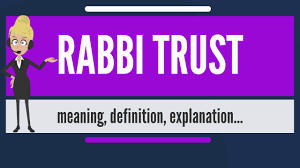Sometimes employees are faced with challenges of securing their assets. Rabbi Trust is the best option to consider for real estate assets. This is because assets within the trust are totally outside the control of the employer. In other words, once the employer makes contributions to a rabbi trust, they cannot retrieve them for any purpose. This article deals with what rabbi trust is, including rabbi trust taxation, agreements, secular trust vs rabbi trust, as well as accounting details.
What is Rabbi Trust?
A rabbi trust is a trust that supports the non-qualified benefit obligations of employers to their employees. .They are typically irrevocable because, once the employer makes contributions to a rabbi trust, they cannot retrieve it. In other words, it creates security for employees because the assets within the trust are totally outside the control of employers. A Jewish rabbi and his congregation first used this type of trust after an Internal Revenue Service (IRS) private letter ruling approved its use. Similarly, trust is for the benefit of both the employer and employee. The company uses it to provide its senior executives with additional benefits to their existing compensation package.

Rabbi trust advantages
- The company uses the trust to provide its senior executives with additional benefits to their existing compensation package.
- It doesn’t keep creditors at bay.
- The funds are not accessible by creditors If a company goes bankrupt.
- It allows the employee to defer paying taxes until he or she withdraws money from the trust.
- It supplements the retirement benefits of highly compensated and valuable employees. This is an attractive way to retain key employees.
Disadvantages
- The risk that the trust assets will be seized by the company’s creditors in bankruptcy is the core disadvantage for participants.
- An employee who is considering entering into a deferred-compensation arrangement in the trust form should consider the company’s financial health in the future.
- When you take distributions from your trust account, the money is seen as supplemental wages, not retirement income.
Secular Trust vs Rabbi Trust
A secular trust is a nonqualified deferred compensation arrangement to compensate executives and key employees. The major distinction between secular trusts and rabbi trusts is that secular trust is not accessible by an employer’s bankruptcy creditors. In contrast, creditors can claim the assets in a rabbi trust after bankruptcy. An employer’s contributions to a secular trust and the trust’s earnings are all taxable income to the executive or key employee.
The employer also receives a current tax deduction for its contributions when the contributions become vested.
A secular trust enables the employer to contribute to an irrevocable trust providing post-employment benefits to the executive. The executive has a nonforfeitable right to these assets in the trust at the time the trust is established
The employee has no access to these assets until the employee’s retirement, death, or termination of employment.
Rabbi Trust Taxation
It is important to understand the rules of taxation when drafting rabbi trusts, especially if the trust will contain provisions not included in the IRS model trust. Such provisions are more likely to be acceptable if they don’t run afoul of the tax doctrines that defer taxation of employees. Before adopting the provisions, it is advisable to consult with legal counsel and document the rationale for such provisions.
This taxation allows employees’ assets to grow without them paying tax on any gains until withdrawal. The trust provides tax advantages for employees. Contributions made to the trust do not count as part of the employee’s wages. It doesn’t provide any tax benefits for companies that make its use limited compared to other types of trusts. Similarly, it’s like a qualified retirement plan.
Rabbi Trust Agreement
A trust agreement form is a form an individual uses in bestowing his property’s rights and ownership to another party. It is also a legal form that helps in securing and protecting the property. Below is a typical sample of a rabbi trust agreement.
Related Articles:
- LIVING TRUST: Overview, Cost, Templates, Pros & Cons (+Writing Guide)
- Example of a Business Plan Executive Summary
- Buy and Sell Agreement: How It Works, Key Elements, and Importance
- 4 Essential pillars to gaining trust in business
Conclusion
Lastly, in balancing your retirement savings plan, we suggest you discuss the distribution options and tax consequences with a professional. This is to ensure that you understand the impact on your finances when you retire. However, a rabbi trust that is not properly created can have significant negative tax consequences. Therefore, anyone considering establishing this trust should consult with an attorney.






